
 |
 |
|
| About Us | Essential Library | Read Past Issues | Resources | Composer Links |
"Concerto America is a thematic evocation of my fascination with American popular music, wending its way through such diverse milieus as rumba clubs I played with, Bar Mitzvahs I attended, writing songs in summer stock and playing piano in strip clubs," says Strouse of his new work. Concerto America is not only a musical autobiography, but also a tribute to a country recently devastated by terrorism: "I can't help feeling that my original ambition for this concerto ... was partially aborted when the terrorist planes struck the twin towers in my hometown. I could not reflect the hurt our country was now suffering. I rewrote much of the piece, yet found myself always coming back to the joy and optimism of America - the crazy quilt of music that seems to see us through, and which remains our country's trademark." Strouse has been composing since the 1950's. He studied with Nadia Boulanger in Paris, Aaron Copland and Darius Milhaud as a three-year scholarship awardee at Tanglewood, and is a graduate of the Eastman School of Music. His professional palette includes chamber and symphonic works as well as operas. His opera, Nightingale, based on a Hans Christian Anderson story, has been performed worldwide. Strouse is not only one of the world's most successful composers ó he is an active advocate for the development of young artists. Through the ASCAP Musical Theatre Workshop in New York, which he created and has directed for 15 years, countless young composers, writers and performers have found a forum for their work. In 1999 ASCAP presented Charles Strouse with their prestigious Richard Rogers Award for his achievement in musical theatre. In addition to his new piano concert piece, he has two musicals optioned for Broadway in 2002: a new stage version of THE NIGHT THEY RAIDED MINSKY's, to be produced by the Manhattan Theater Club, while his musical adaptation of the Paddy Chayevsky film MARTY is scheduled for later this season. Referred to by the legendary Leonard Bernstein as "a splendid musician and a brilliant performer," pianist Jeffrey Biegel performed the American premiere of the fully restored original 1924 manuscript of George Gershwin's Rhapsody in Blue with the Boston Pops at Symphony Hall in Boston. He has subsequently performed this piece with orchestras across the U.S. and in Germany. He has also presented performances from Maine to California of Ellen Taaffe Zwilich's Millennium Fantasy for piano and orchestra, a work he commissioned in collaboration with 26 American orchestras and which was Premiered in September of 2000 with the Cincinnati Symphony Orchestra, Jesus Lopez-Cobos conducting. Future
performances of the Concerto
Further Details on the Web
|
|
Caught
in the Act
Is That a Spear in Your Toga or Are You Just Glad to See Me? by Deborah Kravetz
And donít think Gelbart wasnít involved in this one, as well. He was! But the American Repertory Theatre producers canned him when they decided he had gone overboard. Yoo-hoo! If this isnít overboard, why are we all drowning out here? This version ended up being adapted by Robert Brustein, with lyrics by Matty Selman and music by Galt MacDermott. Did I say some of it reminded me of Hair? And Jesus Christ Superstar, and several early rock songs. Jones has a great voice for exhortatory and impassioned speech, and even sings nicely in a Rex Harrison-sort of way. She was fineóeven better than fine, considering and allóbut this may be one sheíll want to drop from her resume. I havenít seen the Philadelphia Inquirer review yet. Maybe the theater critic is too embarrassed to say anything about a production that could have been done more cleverly by a group of chauvinistic seventh grade boys: men wearing colored balloon penises parading around, coming on to women got up as the most demeaning caricatures of femininity. Oh, dear, Prince Music Theater, what were you thinking to produce an item that should never have gone beyond a workshop edition. Thatís two duds in a row! (What was the name of that last one?) LYSISTRATA
The title of this program, City Shimmer with Urban Underbelly , is a good description of the kind of music Relache performs, and this program summarizing commissions of the 90ís with a world premiere is just the usual stuff, thank you. Singer Anne Sciolla performs vocals in Machaut a Gogo by Eve Beglarian based on Renaissance French themes by Guillaume de Machaut that starts out classically but suddenly breaks into rap to wild percussion with hot sax, bassoon and electric bass solos. The vocal line alternates French and English lyrics to synth harpsichord. Written for modern dance, Close by Erling Wold, highlights concepts of close and not-close, connection and distance, through repetition and rhythmic variations of recurring motifs for flute, clarinet and marimba that impart a sense of lightness and induce a Morse code-like near-hypnotic state with grounding by piano, synth and bowed string bass. The resulting atmosphere is robotic and bleakly futuristic, but objectively not unpleasant and, even, soothing. In the world premiere on this program , Lydian Variations by Shafer Mahoney opens with English horn, clarinet, bassoon and flute; the warbling theme is almost sprightly and repeated with viola, bass, piano and marimba in varying permutations. While the tempo remains constant, rhythm may become smoothed out or more jagged. Extended solo for viola is mellow, for piano cooler, incorporating more harmonies. Classically structured, this piece has a staid Alec Wilder feel, but not his sense of humor; perhaps it harkens back to France in the 1920s. Another Eve Beglarian piece, The Marriage of Heaven and Hell , is based on a quote from William Blake about the nature of opposition and knowing what is enough. This piece features opposing rhythmic patterns to spoken text, while instruments, including piano and vibraphone, reflect the varying patterns. The result is a very user-friendly, slightly Latin-tinged dance. Astronomically speaking, dark matter is the space in between, the silence between the notes, but composer electric guitarist Tim Brady explains that what he intended as a quiet piece, Dark Matter , was suddenly hijacked by a viola solo and pounding octaves. Yes, this is primarily a lovely resonant viola melody, but, joined by rhythmic tutti in which individual instruments expand simultaneously on the theme, introduces a dissonance and divergence, occasionally returning to unison. And so, closing the season. RELACHE
(Reposted
from Penn Sounds 6-20-02)
|
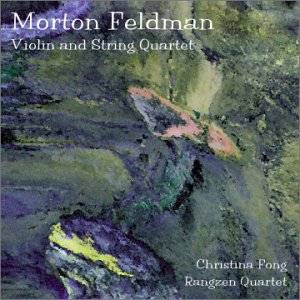
Violin and String Quartet Composer: Morton Feldman Performer: Christina Fong, Karen Krummel, et al. Ensemble: Rangzen Quartet Listening to this epic 2-CD chamber work is like watching a large block of ice melt for nearly two hours--excruciating sameness, tantilizing variation, in equal measures. A labor of love by all involved and the kind of thing that only small, independent labels will do. Bravo OgreOgress Productions |
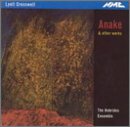
Anake & Other Works Composer: Lyell Cresswell Performer: Daniel Bell, William Conway, et al. Nmc Records - #77 Compositions for solo instruments (other than the piano) rarely get recorded which is a shame because sometimes--as in this case--the results are spectacular. New Zealand-born British composer Cresswell's warm and passionate solo turns for the violin, cello, flute, and piano are given convincing readings by members of The Hebrides Ensemble. |
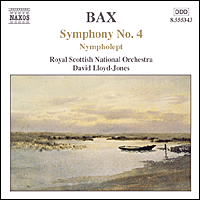
Symphony 4 / Overture / Nympholept Composer: Arnold Bax Peformers Lloyd-Jones, Royal Scottish Nat'l Orch Naxos - #8555343 Not in Vaughn Williams or Arnold's class as a symphonist, Bax nonetheless has a highly invidual voice and offers tremendous pleasures for those who look for less traveled paths. |
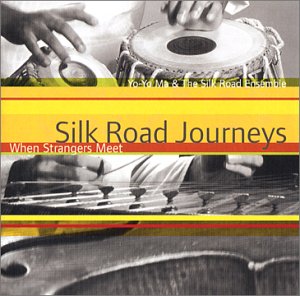
Silk Road Journeys Composer: Michio Mamiya, Franghiz Ali-Zadeh, et al. Performer: Yo-Yo Ma Ensemble: Silk Road Ensemble Sony - #89782 |
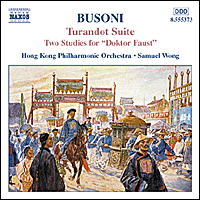
Turandot Suite Composer: Ferruccio Busoni Performers: Wong, Hong Kong Phil Orch Naxos - #8555373 Little-known suite that Busoni extracted from his incidental music to Gozzi's play, Turandot. Completed in 1905, and in eight descriptive sections, it is engaging late Romantic with hints of Straussian darkness. The Saraband and Cortege are from Busoni's better-known Doktor Faust. |
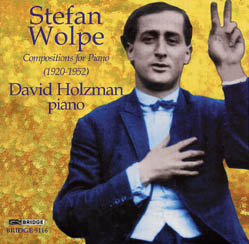
Compositions for Piano (1920-1952) Composer: Stefan Wolpe: Performer: David Holzman, piano BRIDGE 9116 From the nice people at Bridge Records comes an invaluable look at an early and largely forgotten modernist just in time for the Wolpe Centenary (1902-2002) Pianist
Holzman wins the uphill battle with such Wolpe knuckle-busters as the Sonata
No. 1 "Stehende Musik" (1925), the aptly named
|
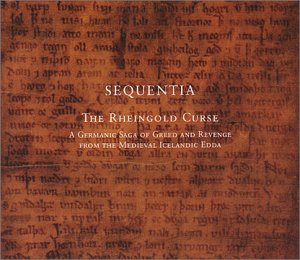
The Rheingold Curse: A Germanic Saga of Greed and Revenge from the Medieval Icelandic Edda Ensemble: Sequentia Marc Aurel Edition - #20016 Wagner's mother lode. Apocalyptic texts, atmospheric performances, bring to shattering life the age of the Vikings and the Valkyries when Gods and mortals jousted for the medieval soul. Thoughtful music for an age in which evil men once more live in caves and wreak havoc upon their fellow men. |
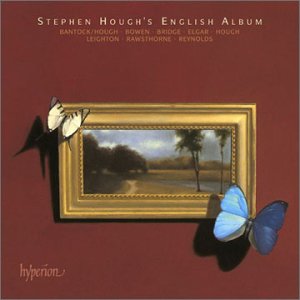
Stephen Hough's English Piano Album Composer: Alan Rawsthorne, Stephen Reynolds, et al. Performer: Stephen Hough Hyperion - #67267 Stephen Hough is among the most talented pianists today and also one of the most adventuresome. Rather than concentrating on the surefire crowd pleasers, he has followed his own tastes which have taken him down a less traditional path. His focus on neglected works by less-known composers is never less than rewarding and particularly so in this CD which showcases virtuoso piano pieces from English composers like Alan Rawsthorne and Stephen Reynolds as well as Elgar and Bridge. A delight from start to finish. |

Speaking Extravagantly Composer: David Stock Performer(s): Cuarteto Latinoamericano innova 563 Stock blends influences from Ives to minimalism, from Bartok to jazz, and from synagogue music to Schoenberg into a fresh and imaginative style of dramatic sweep and lyrical flight. His close collaboration with Cuarteto Latinoamericano, one of the worldís outstanding chamber ensembles, has produced a recording of great emotional power and driving rhythm, with blazing colors and a wide dynamic and expressive range. |
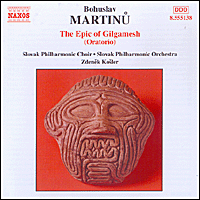
The Epic of Gilgamesh Composer: Bohuslav Martinu Conductor: Zdenek Kosler Performer: Ludek Vele, Stefan Margita, et al. Naxos - #8555138 Gilgamesh was an historical king of Uruk in Babylonia, on the River Euphrates in what is now modern Iraq; he lived about 2700 B.C. Many stories and myths were written about Gilgamesh, some of which were written down about 2000 B.C. in the Sumerian language on clay tablets in the script known as cuneiform and which still survive, providing continuing inspiration for writers and poet and musicians. One of the most inspired of these was Czech composer Bohuslav Martinu, who wrote this magnificent choral masterpiece based on the legend in 1955--only a couple of years before his death. Like virtually everything Martinu wrote, this one is indispensible. |
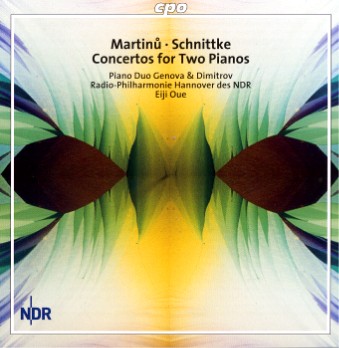
Concertos for Two Pianos Composer: Bohuslav Martinu, Alfred Schnittke Conductor: Eiji Oue Performer: Kathrin Rabus Cpo Records - #999804 An inspired pairing of works for two pianos by two of modern music's real giants. Martinu's concerto is big, sprawling and filled with musical color; Schnittke's is restrained with tensions that build into moments of momentous relief. Taken together, a testimony to the power of the imaginative to produce different, yet equally compelling, solutions to the same problems.
|
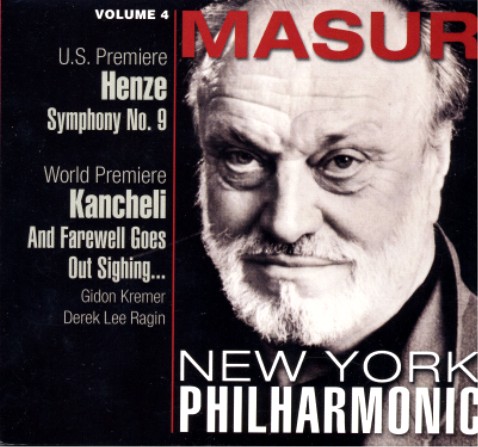
Symphony No. 9 Composer: Hans Henze Performer: NYPhilharmonic Berlin Radio Choir No record can quite capture the excitement of a live performance, but having been there the night the Henze 9th was recorded, I can testify that this CD comes very close to capturing the epic, shattering, passionate, heartbreaking pain of this incredible work. The Philharmonic plays magnificently, and the Berlin Radio Choir sings with total commitment this setting of seven harrowing poems by Hans-Ulrich Treichel, based on Anna Seghers's wartime novel "The Seventh Cross," about the re-capture and martyrdom by crucifixion of seven concentration camp escapees. No one who listens to this work will ever forget it. |
 |
Publisher: Duane Harper Grant (212) 582-4153 Editor: Jerry Bowles (212) 582-3791 Contributing Editor: Deborah Kravetz (C) Sequenza/21 LLC 2000 |